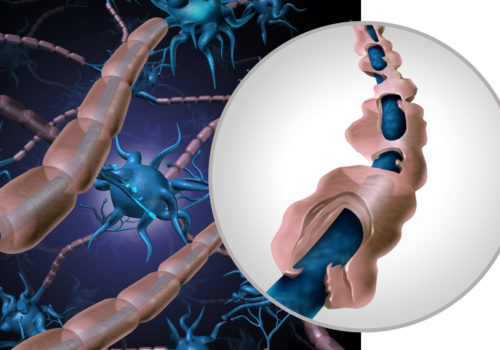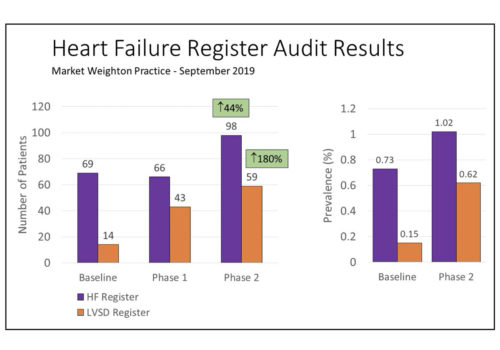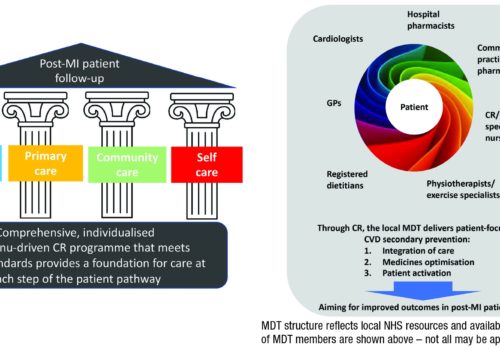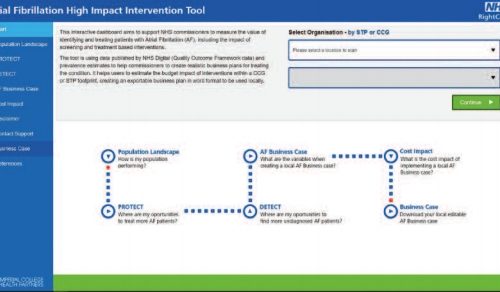What is Multiple sclerosis? Multiple sclerosis (MS), a progressive neurodegenerative disease which arises when the immune system mistakenly attacks and damages tissue in the central nervous system (CNS). This inflammation can affect different sites of the body at different times, producing a wide range of signs and symptoms.
Practical Obesity Management
Recognition of the diverse areas of the brain and multiple neurochemicals and hormones involved in regulation of appetite, satiety and metabolism helps to explain why obesity treatment needs to be individualised and is more complicated that merely instructing people who are living with obesity to eat less and move more. On the contrary, it requires […]
An audit in general practice – Getting a GRASP on heart failure
This audit was carried out using the GRASP-HF audit tool developed by PRIMIS designed to help busy practices achieve a systematic approach to the identification, diagnosis and management of patients with HF.
Freedom from failure – The F word
Nobody likes to talk about failure. We hide from it, shy away from it. Society demands positivity. And so, we do not necessarily take the time or put the effort into learning from failure. Heart Failure is a misunderstood and misdiagnosed condition, as malignant as some of the most common cancers, it should be treated with […]
Impact on mental health – From celebratory ‘Year of the Nurse’ to COVID-19 in 2020
How can nurses be better mental health advocates for their patients and colleagues during the pandemic? 2020 was designated by the World Health Organisation as the inaugural International Year of the Nurse and Midwife. The Covid-19 pandemic has highlighted the critical role nurses play in caring for the mental health of their patients and communities. This article […]
Atrial fibrillation: A closer look
What is AF? Atrial Fibrillation (AF) is the most common heart rhythm disturbance and affects over 33 million people worldwide. Atrial fibrillation or AF occurs when chaotic electrical activity develops in the upper chambers or atria, and completely takes over from the sinus node. As a result, the atria no longer beat in an organised […]
Advice for patients taking ACE inhibitors or angiotensin receptor blockers and coronavirus infection
It has been suggested Hypertension (high blood pressure) may be associated with increased risk of death in hospitalised Coronavirus infected subjects. On non-medical social media sites and some newspapers it has been suggested that commonly used drugs ACEi (ending in ‘pril” e.g. ramipril, lisinopril, perindopril) and ARBs (ending in ‘sartan’ e.g. losartan, candesartan, valsartan) may […]
Helping older adults to stay independent for longer
The role of nutrition and exercise in maintaining muscle mass, strength and function pre and post falls and fractures. With an ageing population, strategies that help older adults to maintain their independence for longer are increasingly important.
A UK consensus on optimising CVD secondary prevention care: Perspectives from multidisciplinary team members
Although overall CV mortality has declined in recent years, patients with clinically manifest CVD remain at increased risk of recurrent CV events. A group of HCPs at UK primary and secondary care centres have recently developed a consensus statement to improve delivery of secondary prevention in the UK.
Practical tools for CVD prevention: The CVD return on investment tool
In 2017 the University of Sheffield was commissioned by Public Health England (PHE) to develop a new return on investment (ROI) tool for cardiovascular disease (CVD) prevention, to be used by national and local decision-makers. The tool focuses on prevention of CVD in six key high-risk groups, identified through the NHS RightCare pathway as being currently underdiagnosed and insufficiently well managed. This includes patients with hypertension, diabetes (type 1 and type 2), non-diabetic hyperglycaemia, atrial fibrillation, chronic kidney disease and high cholesterol (the latter including patients with a QRISK2 score ≥ 10% or familial hypercholesterolaemia).
Practical tools for CVD prevention: The NHS RightCare AF high impact intervention tool
Cardiovascular disease (CVD) prevention has been highlighted by the Next Steps on the Five Year Forward View as a key priority for clinical commissioning groups (CCGs). An important area of focus is improving the management of high-risk conditions for CVD, such as atrial fibrillation (AF). In response to this escalating healthcare priority, Imperial College Health Partners have developed the new AF High Impact Intervention Tool in collaboration with NHS RightCare, as part of their CVD Prevention Pathway.
Practical tools for CVD prevention: NHS RightCare toolkit for CVD and serious mental illness
We know that there are differences in outcomes between populations that cannot be explained by the dictates of evidence-based medicine or by demographics. Core to the work of NHS RightCare is the concept of unwarranted variation and the vital importance of using our shared NHS resources to deliver the best outcomes for our population. In 2018, NHS RightCare developed the toolkit for physical ill health and cardiovascular disease (CVD) prevention in people with severe mental illness (SMI), in close collaboration with Public Health England (PHE).
































